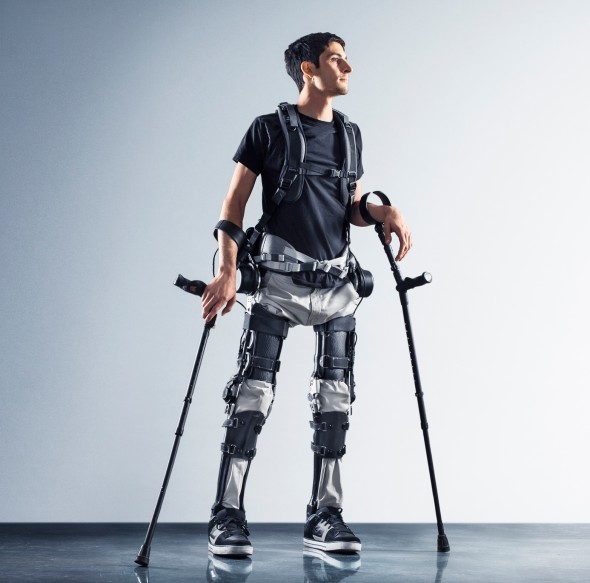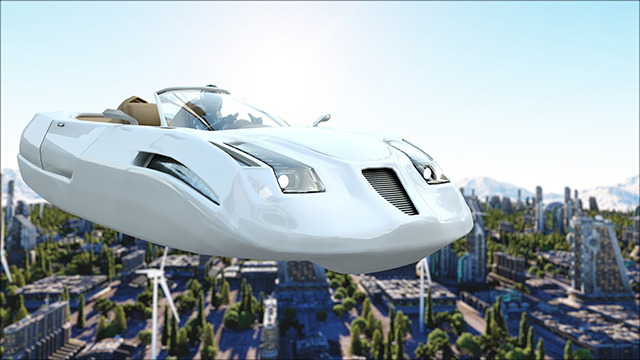
Advertisement
Exoskeletons have leaped from the world of science fiction and found a purpose in the market place. A new exoskeleton, created by SuitX, is helping paralyzed people walk, but not without a price. According to the MIT Technology Review, the suit has a $40,000 price tag attached to it.
What makes this exoskeleton, dubbed Phoenix, unique is that it is the lightest exoskeleton available, clocking in at 27 pounds. The suit helps move the knees and hips with small motors added to standard orthotics. By pushing buttons attached to a pair of crutches, users can move their legs and walk up to 1.1 miles per hour. Phoenix is also adjustable, so that it can fit a person of practically any height.
A battery pack sported as a backpack energizes the exoskeleton for up to eight hours. In addition, an app can be used to monitor a users walking data. The exoskeleton has been used primarily to help patients with spinal cord injuries walk again.
Suits could replace wheelchairs if made financially feasible
“We can’t really fix their disease. We can’t fix their injury. But what it would do is postpone the secondary injuries due to sitting,” SuitX founder and CEO Homayoon Kazerooni, told sources. “It gives a better quality of life,” he adds.
The technology responsible for SuitX’s exoskeleton came from the Robotics and Human Engineering Laboratory at the University of California, Berkeley, which Kazerooni heads. He said his overall goal is to create a model of the exoskeleton fit for children. Children with neurological disabilities sometimes require intensive walking training, otherwise they could lose their mobility.

Phoenix isn’t limited to patients with spinal cord injuries, however. The device could also provide therapeutic benefits for people who suffered from a stroke or motor accident.
Phoenix isn’t the only exoskeleton in town though. Competing suits like the ReWalk cost $70,000 and weighs nearly 50 pounds. If exoskeleton producers can significantly lower the cost of production, the suits could start superseding wheelchairs.
Try walking in someone else’s exoskeleton
Volker Bartenbach, an exoskeleton researcher at ETH Zurich, claims a mixture of performance, cost and clinically tested benefits are the necessary ingredients for the first widely used exoskeleton.
“Speed, operating time, mobility, and usability have to be good enough so that those systems are perceived as better by the user than the alternatives,” Bartenbach says. “If you need 10 minutes to walk to the bakery 300 feet away in your exoskeleton that takes five minutes to put on, you will probably use the wheelchair instead,” he added.
The exoskeleton isn’t without its shortcoming, however. Although Phoenix is light, it’s not light enough. The Harvard prototype was unable to fit under people’s clothes. Furthermore, Phoenix is cheaper than other exoskeletons on the market but that doesn’t mean it’s affordable. Its $40,000 price tag may be worth the investment but it’s feet too steep for many people financially.
Sanchez has traveled across the globe with SuitX parading the Phoenix exoskeleton. Prior to the advent of the suit, he was training to kill the nerves in his hands in order to support his body’s weight with crutches.
The custom carbon orthotics stick the suit to the body like braces that stick to teeth. In addition, the suit is quiet. The most striking feature of the assemble is the crutches. The suit requires too much maintenance for Sanchez to keep one at home; however, he is hopeful that SuitX will provide him a unit one day.
“If I had this it would change a lot of things,” Sanchez says. “It’s a necessity at this point.”
Sources include:
(3) GiizModo.com
Submit a correction >>
This article may contain statements that reflect the opinion of the author
Advertisement
Advertisements















